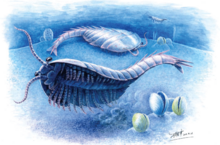Guangweicaris

| Guangweicaris Temporal range: | |
|---|---|
 | |
| YKLP 11141 largely complete specimen in dorsal view | |
| Scientific classification | |
| Domain: | Eukaryota |
| Kingdom: | Animalia |
| Phylum: | Arthropoda |
| Order: | †Fuxianhuiida |
| Family: | †Fuxianhuiidae |
| Genus: | †Guangweicaris Luo, Fu, and Hu in Luo et al., 2007 |
| Type species | |
| Guangweicaris spinatus Luo, Fu, and Hu in Luo et al., 2007 | |


Guangweicaris is an extinct genus of fuxianhuiid arthropod known from the Cambrian period. It is only known from the type species Guangweicaris spinatus, which is known from the Cambrian Stage 4 Guanshan Biota near Kunming. It is currently the latest known fuxianhuiid. It was first described in 2007,[1] and was given a comprehensive re-description in 2020.[2] It is currently known from over 150 specimens. Within the fuxianhuiids it is sister to Fuxianhuia, together forming the clade Fuxianhuiidae. In comparison to Fuxianhuia it has a wide, oval shaped opisthothorax and a proportionally longer, narrow tail-like abdomen, with 3 prothoracic tergites, 5 opisthothoracic tergites and 7 abdominal tergites, it also possesses a row of spines running down the central axis of the body from the second opisthothoracic tergite.[2]
Phylogeny
[edit]From [3]
| ||||||||||||||||||||||
References
[edit]- ^ H.-L. Luo, X.-P. Fu, S.-X. Hu, Y. Li, S.-G. Hou, T. You, J.-Y. Pang and Q. Liu. 2007. A New Arthropod, Guangweicaris Luo, Fu et Hu gen. nov. from the Early Cambrian Guanshan Fauna, Kunming, China. Acta Geologica Sinica 81:1-7
- ^ a b Chen, Hong; Legg, David; Liu, Yu; Hou, Xian-guang (2020). "New data on the anatomy of fuxianhuiid arthropod Guangweicaris spinatus from the lower Cambrian Guanshan Biota, Yunnan, China". Acta Palaeontologica Polonica. 65. doi:10.4202/app.00508.2018.
- ^ Yang, Jie; Ortega-Hernández, Javier; Legg, David A.; Lan, Tian; Hou, Jin-bo; Zhang, Xi-guang (2018-02-01). "Early Cambrian fuxianhuiids from China reveal origin of the gnathobasic protopodite in euarthropods". Nature Communications. 9 (1). doi:10.1038/s41467-017-02754-z. ISSN 2041-1723. PMC 5794847. PMID 29391458.